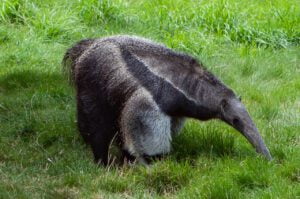
Ongoing Risk of Oil Spills in the Ecuadorian Amazon Threatens Indigenous Peoples, Imperiled Wildlife, and the Bajo Napo Key Biodiversity Area
Q2 2020 hedge fund letters, conferences and more
Provincial Court to Announce Decision Tuesday on Shuttering Pipelines That Threaten an Imminent Second Oil Spill on Heels of Catastrophic April 7 Pipeline Rupture
The Provincial Court of Orellana in Ecuador’s Amazon will be announcing its decision Tuesday, September 1, in a lawsuit filed by the Indigenous Kichwa peoples against the Ecuadorian government and oil companies responsible for a major oil spill April 7.
The spill was the result of pipelines that ruptured from erosion and put at risk the safety and health of the Kichwa people; communities in Ecuador, Peru and Brazil that depend on clean rivers for drinking water; and a number of endangered and vulnerable wildlife species in the area. Aggressive erosion and massive landslides are threatening an imminent second oil spill.
“The lives of Indigenous people in Ecuador are now more threatened than ever,” said Lina Valencia, Global Wildlife Conservation’s Colombia conservation officer. “Indigenous peoples are the guardians of the forests and they are critical to maintaining the health of our planet. We are standing up and supporting our indigenous partners by amplifying their voices to help ensure that their demand for a moratorium on all extractive activities in the Amazon is heard, recognized and honored.”
The Bajo Napo Key Biodiversity Area Affected By The Oil Spill
The affected indigenous territories overlap the Bajo Napo Key Biodiversity Area (KBA), a site of global importance to the planet’s overall health and the persistence of biodiversity. The KBA is home to a remarkable diversity of wildlife. With more than 580 species of birds, including harpy eagles, zigzag herons and cocha antshrike, and high levels of biodiversity of species of ant birds, tyrant flycatchers, ovenbirds, parrots and tanagers, the KBA is a popular spot for ornithologists and birdwatchers.
The Bajo Napo Key Biodiversity Area includes flooded forests, land and riparian forests, blackwater lagoons, and canals that connect to the Napo River by small tributary rivers. It encompasses a number of nature reserves, including a UNESCO Biosphere Reserve and Ramsar Wetland of International Importance.
The KBA’s imperiled species include giant armadillos, giant anteaters, lowland tapirs, mountain lions, jaguars, Goeldi’s monkeys, Amazon River dolphins and Amazonian manatees. In addition to the threat of another oil spill, these species face the threats of deforestation for cattle ranching and other agricultural activities, and poaching for wildlife trade.
“The diversity of life on Earth is essential for a healthy planet where all life can thrive, including people,” said Penny Langhammer, Global Wildlife Conservation executive vice president of science and strategy. “Both the rights of indigenous people and Key Biodiversity Areas like Bajo Napo must be safeguarded to ensure the long-term survival of the diversity of life on Earth. Ecuador has an opportunity to demonstrate what environmental justice looks like by upholding the rights and protecting the ancestral lands of indigenous peoples, guaranteeing the conservation of unique biodiversity, and ceasing the unsustainable extractive activities that put both at risk.”
A Demand To End To Oil Company Impunity
Backed by human rights organizations, indigenous communities affected by the resulting oil spill in April immediately filed a lawsuit asking for cleanup, compensation, and an end to oil company impunity.
“My people, the Kichwa, have shared every detail about the nightmare we have been living since the oil spill occurred on our lands with the government, the oil companies and the Ecuadorian court,” said Carlos Jipa, president of F.C.U.N.A.E. “We will not remain silent while our rivers remain contaminated by oil and threatened by yet another spill. We are intensifying our call for justice, and no matter what the court rules on Tuesday, we will not stop until justice is served.”
When the court case was suspended in June under suspicious circumstances, Kichwa communities along the spill zone—with support from GWC partners COICA and Amazon Frontlines, and a coalition of regional and international human rights organizations—escalated their case on August 4 by filing dozens of precautionary measures that demanded the immediate suspension of the flow of crude oil through Ecuador’s SOTE and OCP pipelines. This would equate to a suspension of all oil production in Ecuador at a time of heightened risk to Indigenous peoples living along the pipeline, who are dually threatened by a global pandemic and oil contamination.
“For too long, oil companies have acted with impunity in the Amazon,” said Mitch Anderson, executive director of Amazon Frontlines. “It is imperative that the Ecuadorian court acknowledges the constitutional rights of Indigenous peoples and nature and issues a ruling on Tuesday to suspend the country’s oil pipelines and avoid another disaster. With overwhelming evidence in their favor, the affected Kichwa Indigenous communities await justice, and, no matter the outcome, will continue fighting to protect one of the most biodiverse places on Earth and our best natural defense against climate change, the Amazon rainforest.”
Global Wildlife Conservation
GWC conserves the diversity of life on Earth by safeguarding wildlands, protecting wildlife and supporting guardians. We maximize our impact through scientific research, biodiversity exploration, habitat conservation, protected area management, wildlife crime prevention, endangered species recovery, and conservation leadership cultivation. Learn more at https://globalwildlife.org
The post Oil Spill Threatens The Bajo Napo Key Biodiversity Area appeared first on ValueWalk.
